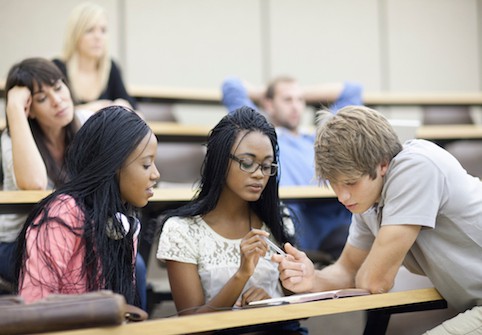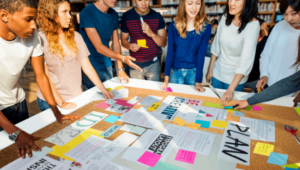Why Investing in Learning Mindsets Matters

“We believe deeply that when students have learning mindsets and skills, they are motivated to learn and know how to learn. Compelling scientific evidence shows strong connections between learning mindsets and improved student outcomes. We want others to share our enthusiasm and help us maximize students’ motivation and engagement.”
This quote is from the Raikes Foundation, based in Seattle, where learning mindsets and skills are a top priority.
We recently had the opportunity to chat with Erin Kahn, Executive Director of the Raikes Foundation. The Raikes Foundation’s highest priority is to “empower young people to transform their lives.” Founded by Jeff and Tricia Raikes in 2002, the foundation focuses on education, out of school youth programs and youth homelessness.
The foundation’s work in the education sector involves the promotion of learning mindsets and skills. The foundation has played an important role in advancing the cutting-edge research that has validated the importance of students’ mindsets as a determinant of academic and life success. The research Raikes Foundation is funding shows that students’ beliefs about their capacity to learn, their understanding that learning is a process, their feelings of belonging in the classroom and their ability to relate coursework to their own lives fundamentally influences academic achievement. One research paper, Teaching Adolescents to Become Learners: The Role of Noncognitive Factors in Shaping School Performance, published in 2012 by the University of Chicago Consortium on Chicago School Research, has become a must-read for anyone who wants to learn more about the role that mindsets and learning strategies, in addition to other noncognitive factors, play in student success.
There are many stakeholders involved in effectively developing learning mindsets, starting with students and their teachers.
Students and teachers.
We asked Erin what educators need to know about effective strategies to help their students develop learning mindsets. Erin said, “We are starting to get a more sophisticated understanding of the science behind what it means to develop learning mindsets. We now have rigorous research that illustrates to us that academic performance is mediated by mindsets and we know that those mindsets can be positively influenced. Teachers play a huge role in this. We are working with educators and researchers to develop a richer understanding of the everyday practices that teachers can use in their classrooms to promote positive mindsets for learning. One example is the Mindset Kit recently released by Stanford PERTS, which is one of our grantees.”
Leaders.
Reiterating our own research about roles that leaders play in fostering deeper learning, Erin discussed how important a leader is in being both an enthusiastic coach and also someone who holds the vision of the organization. Leaders play a significant role, Erin said, “in communicating to teachers the importance of mindsets that activate learning. Teachers can model this for students, and leaders can model this for teachers. Principals and superintendents can help support this mindset shift and coach teachers about the importance of a growth mindset. Teachers also need to have a growth mindset about their students’ ability to improve and succeed.” (At Getting Smart, we recently released a paper titled Preparing Leaders for Deeper Learning about the roles that leaders play to foster and cultivate deeper learning, as well as recommendations for leadership preparation.)
Parents.
Parents, Erin said, want tools to help their children develop the mindsets that will motivate them to persist in the face of academic challenges. Raikes Foundation, in partnership with other organizations, is developing tools and strategies that will support parents in encouraging learning mindsets at school, at home and everywhere in between. (At Getting Smart, we have recently published blogs for parents about how to best activate learning mindsets with students: Growth Mindset Parenting and Changing the Mindset of Education: Every Learner is Unique as part of our Smart Parents series).
Measurements.
Erin and I discussed how we might measure learning mindsets and skills. Erin suggested that learning mindsets can be context specific and a student’s disposition toward learning can change over time. Given this, Erin said assessments would ideally be used formatively- for example, by observing how students apply learning strategies over time. A student can also self-report learning mindsets, which could help a teacher pinpoint why a student is struggling with a given subject or class. “If a student declares that they’re just not good at math, helping that student to improve may require more than just focusing on the actual math. It may entail attending to that student’s mindset. This means using a different set of strategies to bolster a students’ belief in their capacity to learn, even in challenging subject like math.” The Raikes Foundation’s investment in the Mindset Kit is just one of the ways it is exploring strategies to help educators foster learning mindsets, including professional development and specialized curriculum that teachers can use in their classrooms
Actively engaging parents and teachers by creating classroom resources and online tools about learning mindsets is critical to helping students succeed. Providing specific, proven strategies for implementation is an important part of the work to ensure all students see themselves as learners, enjoy learning and have the mindsets and skills to support lifelong learning. This is a message we love to spread at Getting Smart.
For more on impact opportunities in K-12 education, see:
For more on specific tools to activate learning mindsets, see:





0 Comments
Leave a Comment
Your email address will not be published. All fields are required.